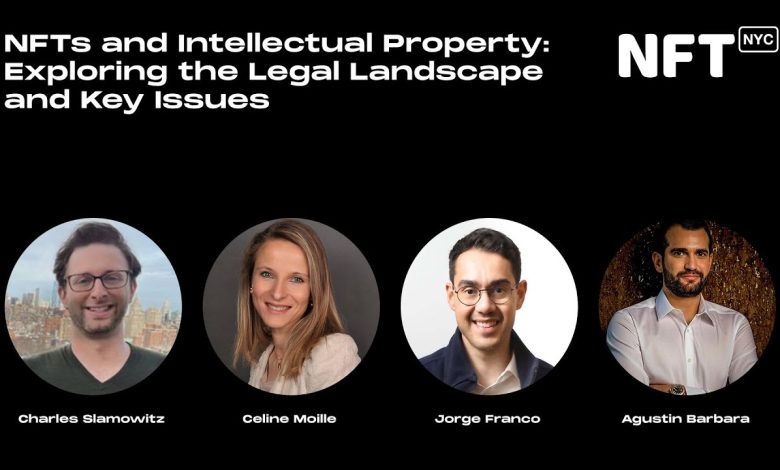The Legal Landscape for NFTs

- Understanding the Basics of NFTs
- The Rise of NFTs in the Digital Art World
- Legal Challenges Surrounding NFTs
- Intellectual Property Rights and NFTs
- Regulatory Considerations for NFT Marketplaces
- Future Trends in NFT Legislation
Understanding the Basics of NFTs
NFTs, or non-fungible tokens, have gained significant popularity in recent years as a new form of digital asset. These unique tokens are built on blockchain technology, making them secure and tamper-proof. Unlike cryptocurrencies such as Bitcoin or Ethereum, NFTs are indivisible and cannot be exchanged on a like-for-like basis.
NFTs represent ownership or proof of authenticity of a digital asset, whether it be artwork, music, videos, or even virtual real estate. Each NFT is unique and cannot be replicated, making it a valuable digital collectible. The value of an NFT is determined by factors such as scarcity, demand, and the reputation of the creator.
One of the key features of NFTs is their ability to be bought, sold, and traded on various online marketplaces. This has led to a booming NFT market, with some tokens selling for millions of dollars. However, the legal landscape surrounding NFTs is still evolving, with questions arising around issues such as copyright, intellectual property rights, and ownership.
It is essential for anyone involved in the NFT space to understand the basics of how these tokens work and the legal implications that come with owning or trading them. By educating yourself on NFTs, you can protect yourself from potential legal disputes and ensure that you are acting within the boundaries of the law.
The Rise of NFTs in the Digital Art World
The rise of NFTs in the digital art world has been nothing short of revolutionary. Non-fungible tokens have opened up a whole new realm of possibilities for artists, allowing them to tokenize their work and sell it directly to collectors without the need for intermediaries. This has democratized the art market, making it more accessible to a wider audience.
NFTs have also brought about a new level of transparency and security to the art world. Each token is unique and cannot be replicated, making it easy to verify the authenticity of a piece of digital art. This has helped to combat issues such as art forgery and copyright infringement, giving artists more control over their work.
One of the key benefits of NFTs is that they allow artists to earn royalties every time their work is sold. This has the potential to provide a more sustainable income stream for artists, who have traditionally struggled to make a living from their art. It also incentivizes collectors to support artists, knowing that their investment will continue to benefit them in the long run.
As NFTs continue to gain popularity, the legal landscape surrounding them is still evolving. There are questions around copyright ownership, licensing agreements, and intellectual property rights that need to be addressed. It is important for artists and collectors to understand the legal implications of buying and selling NFTs to ensure that they are protected.
Overall, the rise of NFTs in the digital art world represents a significant shift in how art is created, bought, and sold. It has the potential to revolutionize the art market, giving artists more control over their work and creating new opportunities for collectors. As the technology continues to develop, it will be interesting to see how the legal landscape adapts to accommodate this new form of art ownership.
Legal Challenges Surrounding NFTs
There are several legal challenges surrounding non-fungible tokens (NFTs) that have emerged as this digital asset class has gained popularity. One of the main issues is the lack of clarity around intellectual property rights and ownership of NFTs. Since NFTs are unique digital assets that can represent various forms of content, including art, music, and videos, determining who owns the underlying intellectual property rights can be complex.
Another legal challenge is the potential for copyright infringement when creating or selling NFTs. Artists and creators may unknowingly use copyrighted material in their NFTs, leading to legal disputes with the original copyright holders. Additionally, the decentralized nature of blockchain technology, which is used to create and trade NFTs, can make it difficult to enforce copyright laws and protect intellectual property rights.
Smart contracts, which are self-executing contracts with the terms of the agreement directly written into code, also present legal challenges for NFTs. While smart contracts can automate the sale and transfer of NFTs, they may not always align with traditional legal frameworks and regulations. This can lead to disputes over the validity and enforceability of smart contracts in the event of a legal dispute.
Intellectual Property Rights and NFTs
Intellectual property rights play a crucial role in the world of NFTs. NFTs are unique digital assets that can represent various forms of intellectual property, such as art, music, videos, and more. When an NFT is created, the creator retains the intellectual property rights associated with the underlying asset. This means that even though the NFT can be bought, sold, and traded, the creator still owns the rights to the original work.
However, it is essential to note that owning an NFT does not automatically grant the buyer intellectual property rights to the underlying asset. The buyer only owns the token itself, not the copyright or other intellectual property rights. This distinction is crucial to understand, as it can impact how NFTs are used and traded in the marketplace.
Creators must be cautious when minting NFTs to ensure that they are not infringing on the intellectual property rights of others. It is essential to verify that they have the necessary rights to create and sell the NFT. Failure to do so could result in legal action and damage to their reputation in the industry.
Regulatory Considerations for NFT Marketplaces
When it comes to NFT marketplaces, there are several regulatory considerations that need to be taken into account. These considerations are crucial for ensuring compliance with existing laws and regulations, as well as for protecting both buyers and sellers in the marketplace.
One of the key regulatory considerations for NFT marketplaces is the issue of intellectual property rights. NFTs are often used to represent digital assets such as artwork, music, or videos, which can raise questions about who owns the underlying intellectual property rights. It is important for NFT marketplaces to have clear policies in place to address these issues and to ensure that they are not facilitating the sale of infringing content.
Another important regulatory consideration for NFT marketplaces is the issue of money laundering and terrorist financing. Because NFTs can be bought and sold anonymously using cryptocurrency, there is a risk that they could be used for illicit purposes. NFT marketplaces need to have robust anti-money laundering and know-your-customer procedures in place to prevent this from happening.
Additionally, NFT marketplaces may also need to consider securities laws. Depending on how an NFT is structured, it could be considered a security under existing laws. This could have implications for how NFTs are bought and sold on the marketplace, as well as for the disclosure requirements that may apply.
In conclusion, NFT marketplaces need to be aware of and comply with a range of regulatory considerations to ensure that they are operating legally and ethically. By addressing issues such as intellectual property rights, money laundering, and securities laws, NFT marketplaces can create a safer and more secure environment for buyers and sellers alike.
Future Trends in NFT Legislation
As the popularity of NFTs continues to rise, there is a growing need for legislation to catch up with this emerging technology. Governments around the world are starting to take notice of NFTs and are beginning to explore ways to regulate them. Here are some future trends in NFT legislation to keep an eye on:
- Increased Regulation: With the increasing popularity of NFTs, it is likely that governments will start to implement more regulations to protect consumers and investors. This could include requirements for disclosures, anti-money laundering measures, and taxation.
- Intellectual Property Rights: One of the key issues surrounding NFTs is the ownership of intellectual property rights. As more artists and creators enter the NFT space, there will be a need for clearer laws around copyright and trademark issues.
- Smart Contracts: NFTs are often built on blockchain technology and rely on smart contracts to facilitate transactions. As smart contracts become more prevalent in the NFT space, there may be a need for legislation to clarify the legal status of these contracts.
- Cross-Border Regulations: NFTs are a global phenomenon, with buyers and sellers from all over the world participating in the market. This raises questions about which jurisdiction’s laws apply to NFT transactions and how disputes will be resolved across borders.
- Consumer Protection: As with any new technology, there is a risk of fraud and scams in the NFT space. Governments may introduce regulations to protect consumers from these risks, such as requiring platforms to conduct due diligence on sellers and provide clear information to buyers.
Overall, the future of NFT legislation is still uncertain, but it is clear that governments are beginning to take notice of this emerging technology. As the NFT market continues to grow and evolve, we can expect to see more regulations put in place to ensure the integrity and stability of the market.




